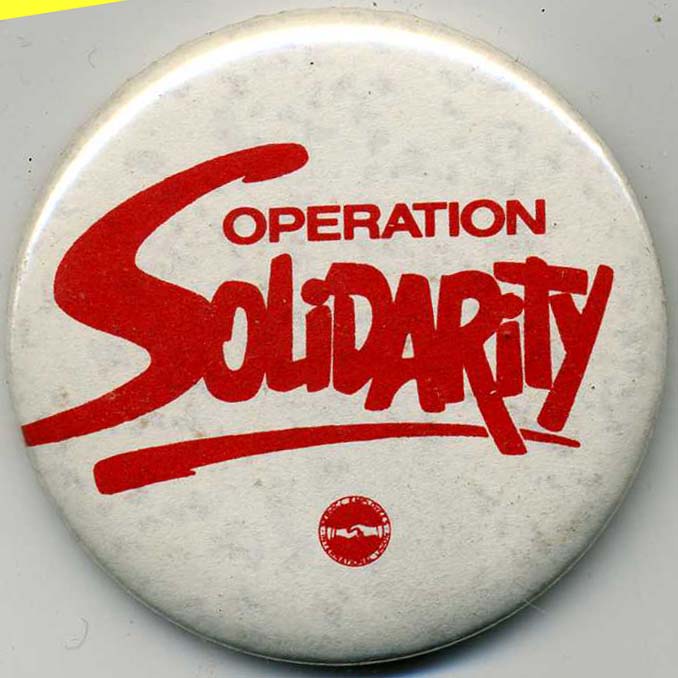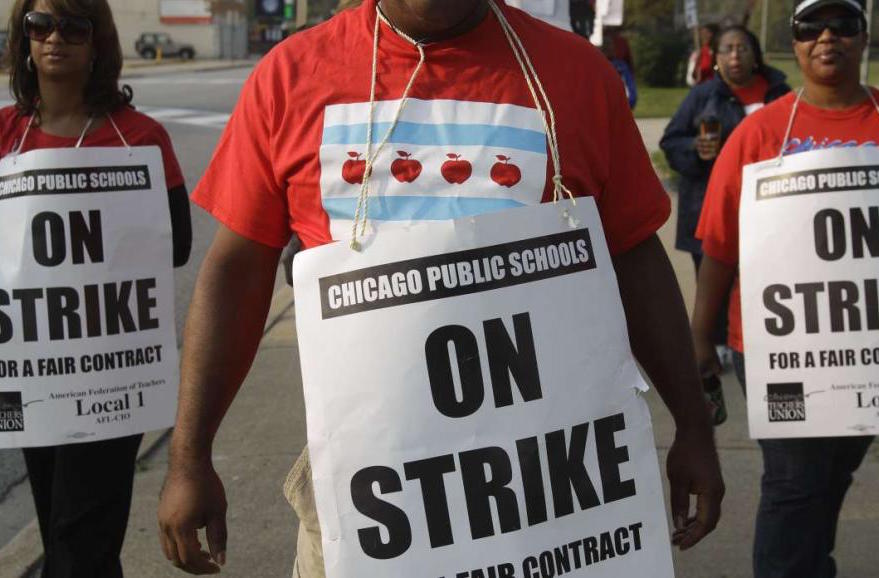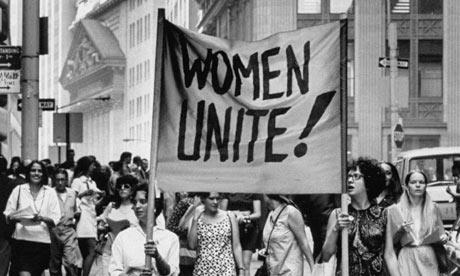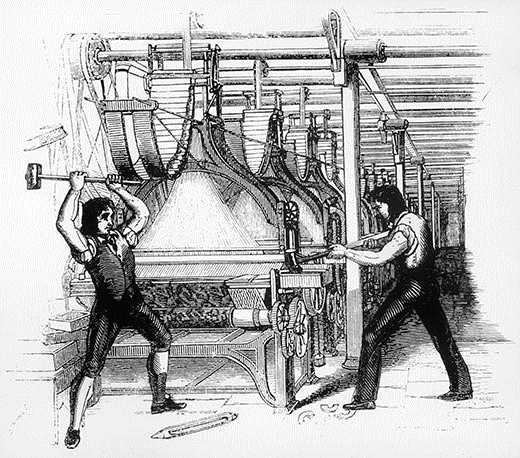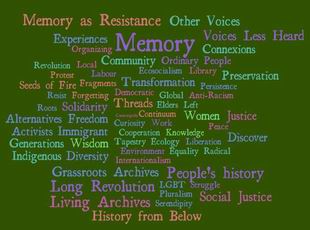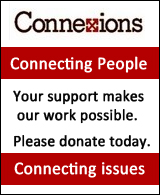Other Voices: The Connexions Newsletter
January 16, 2016
This issue: Working Class Organizing
Working to change things for the better, fighting to prevent things from getting worse, remembering the past to illuminate possibilities for the future: as always, that is the focus of Other Voices. In this issue, we pay special attention to working class organizing. There can be no meaningful change without the active participation of the majority of the population: working people. Yet much activism ignores this obvious reality, while the organized labour union movement has put much of its reliance on ‘professionals’ who see organizing as a top-down technique rather than a grassroots movement. Several articles in this issue look at aspects of these issues.
We also delve into the relationship between feminism and socialism, and look at the so-called ‘sharing economy,’ which produces increasingly exploited and precarious work, and immense profits for super-rich corporate owners.
As always, we invite you to share this newsletter with your friends. You can forward this email, or send them the link to the Other Voices home page on the Connexions website at www.connexions.org/Media/CxNewsletter.htm.
If you'd like to subscribe and receive this newsletter by email every two weeks, please use this form.
Your feedback is appreciated - and so are donations to keep us doing what we're doing!

Topic of the Week
Labour Organizing
Working people face a continuous onslaught on their livelihoods, working conditions, communities, and environment. Organizing to fight back and bring about change is a crucial challenge. Connexions features a wide range of reports, analyses, debates, and resources from around the world, wherever working people are organizing. Explore some of them here.
This Week on Connexions.org
Having the Hard Conversations
An interview with labour organizer Jane McAlevey on labour’s crisis of strategy and the difference between organizing and mobilizing. She says “the problem when we’re doing just a mobilizing model: all we’re doing is talking to the already-convinced and we’re not doing base expansion. Real organizing is about focusing on people who are not yet convinced and not yet involved in our movement.... to rebuild a powerful movement... we have to focus on the people who are not yet with us, and we’re not reaching them through Facebooking and tweeting. Read more
Keywords: Labour Organizing - Organizing
Essential reading on the Paris climate agreement
An annotated guide to thirty-four of the best articles on the COP21 Paris Agreement on climate change published in the immediate aftermath of the agreement. Read more
Keywords: Climate Change - Global Warming
More than equality: reasons to be a feminist socialist
Hilary Wainwright reflects on the ways that feminism transformed visions of socialism – and the ways in which a vision of a feminist socialism still has not been realized. She says “I'm repeatedly shocked by the fact that the relevance of feminism for the rethinking of socialism hasn't been taken on board, and that the left has trudged on as usual, making its usual mistakes, pretty much as if feminism had never really done more than 'put women on the agenda'. The left adopted policies towards women, but has not carried out a fundamental rethink of socialism, which is what I felt feminism was enabling us to do.” Read more
Keywords: Feminism - Socialist Feminism
The Boy Who Could Change the World
Remembering the brief life of Aaron Swartz: programmer, activist, entrepreneur, community builder. Aaron championed openness, sharing, and collaboration, for their own sake, and because he believed they brought out the best in others. Facing prison for the ‘crime’ of sharing academic journal articles online, he committed suicide in January 2013, at the age of 26. Read more
Keywords: Information/Access to - Online Collaboration
Uber and the Luddites
Just as power looms and other machines inaugurated a technological revolution that ultimately produced more work for the many and greater wealth for the few, so too modern technologies are enriching Silicon Valley’s billionaires at the expense of drivers, delivery folk and all manner of service workers. The sharing economy that is experienced by consumers as a friendly convenience is a low-wage, precarious trap for workers. It would sound all too familiar for the skilled cloth-makers 200 years ago who wanted machines to give them more leisure and continued control over their work, but instead found themselves subsidizing the profits of the machine owners in England’s “satanic mills.” Read more
Keywords: Cooperatives - Luddites
Website of the Week
Labor for Sustainability
Labor for Sustainability sets out the problem it is trying to address as follows: “While the economic and environmental crises facing us are widely recognized, so far there has been little success in putting the world on an alternative path that is sustainable economically, socially, and environmental. Neither the labour nor the environmental movements have been able to institute fundamental reforms or move their agendas forward in any large scale or impactful way. And, despite frequent cooperation on discrete issues, the two movements have failed to coalesce around a shared vision for the future. Even when their positions converge, their collaborations tend to be transactional and seem to come out of different intellectual playbooks.” Visit their website here.
Keywords: Labour Organizing - Environment/Employment Issues
Book of the Week
Red Rosa
By Kate Evans
A giant of the political left, Rosa Luxemburg is one of the foremost minds in the history of revolutionary socialist thought. To Marx’s biographer Franz Mehring, no one came as close to the towering intellect of Marx himself. But she was much more than just a thinker. She made herself heard in a world inimical to the voices of strong-willed women. She overcame physical infirmity and the prejudice she faced as a Jew to become an active revolutionary whose philosophy enriched every corner of an incredibly productive and creative life – her many friendships, her sexual intimacies, and her love of science, nature and art. Always opposed to the First World War, when others on the German left were swept up on a tide of nationalism, she was imprisoned, and then murdered in 1919 fighting for a revolution she knew to be doomed.
Red Rosa gives Luxemburg her due as a radical and human being. In this beautifully drawn work of graphic biography, writer and artist Kate Evans has opened up her subject’s intellectual world to a new audience, grounding Luxemburg’s ideas in the realities of an inspirational and deeply affecting life. See more
Keywords: Rosa Luxemburg - Graphic Novels
Film of the Week
Dignity of the Nobodies (La dignidad de los nadies)
A film depicting the December 2001 rebellions in Argentina. The film depicts the economic and social crisis facing the country, and its impact on ordinary people, focusing on people from Buenos Aires' poorest shantytowns, crumbling hospitals, and women middle class farmers fighting multi-national banks that are shamelessly appropriating their farmlands. See more
Keywords: Argentina - Community Organizing
Organizing
Keystone XL opponents need a jobs program
The victorious Keystone campaign also exposed the perennial Achilles' heel of those who are fighting against climate change: We are often painted by our opponents and perceived by the public as caring more about the environment than about jobs. The neglected half of the job for environmental advocates is to ourselves become the voice for job creation. We need to develop robust programs to put unemployed pipefitters, teamsters, and others back to work. Indeed, the prerequisite for every environmental campaign should be a plausible and detailed jobs program. The sustainability movement must be a voice for workers, students, and others who want to both save the earth and promote appropriate economic development. Read more
Keywords: Environment/Employment Issues - Environmental Justice
People's History
One by One, South Sudan Tries to Name Its War Victims
In South Sudan, where a vicious civil war has been raging, no government office or nongovernmental organization has kept a tally of the names of those killed by government forces, rebels, and other armed groups. But in a country in which automatic weapons are more plentiful than civil rights, and local journalists are regularly under assault, a tiny civil society group is trying to step into the breach by naming all of the names. It began on the first anniversary of the civil war’s outbreak, when a small group of volunteers unveiled a list of 568 names of the people - from toddlers to centenarians - killed in the war to that point. Naming the Ones We Lost was a first step in what the organizers knew would be a long journey to grapple with the immense loss of South Sudanese life over the previous year. Today, the project goes by a slightly different name, Remembering the Ones We Lost, and has a radically expanded mission with a recently launched website. The goal of the website is nothing short of remarkable - it aims to name all victims of conflict and armed violence in South Sudan since 1955. Read more
Keywords: South Sudan - Memorials
From the Archives
The Digital Dark Ages: Movies and Books Get Deleted as Selfies Pile Up
Historians and archivists call our times the “digital dark ages.” The name evokes the medieval period that followed the collapse of the Roman Empire, which led to a radical decline in the recorded history of the West for 1000 years. But don’t blame the Visigoths or the Vandals. The culprit is the ephemeral nature of digital recording devices. The irony is that, even as we’re generating more records than any civilization ever, we’re destroying so much important stuff that future generations will hardly know we ever lived. Read more
Keywords: Collective Memory - Information Destruction
Connexions Calendar
January 17, 2016
Role of Faith Group in Welcoming and Integration of Syrian Refugees
January 19, 2016
Film screening: The Price We Pay
January 23, 2016
Kinder Morgan Pipeline Rally
January 26, 2016
Postal Banking: Not Your Predatory Lender
January 27, 2016
International Day of Commemoration of Victims of the Holocaust
January 28, 2016
Stories of Ours
January 28-31, 2016
Guelph Organic Conference
The Connexions Calendar is an online calendar that exists to advertise events that support social justice, democracy, human rights, ecology, and other causes. We invite you to use it to promote your events. Adding events to the Connexions Calendar is FREE. We'll give you a username and password which you use to log on. Use the contact form to arrange for a username and password. Read more →
Seeds of Fire
January 17, 1953
I.F. Stone’s weekly
In the midst of the McCarthy era in the United States, the radical journalist I.F. Stone started I.F. Stone’s Weekly, an independent radical source of news and analysis (published until 1971).
January 17, 1961
Murder of Patrice Lumumba
Patrice Lumumba was a Congolese independence leader and the first prime minister of the Democratic Republic of the Congo after it gained its independence from Belgium. Considered too radical by the Western powers and their local allies, Lumumba was seized, a few weeks after becoming prime minister, in a coup orchestrated by the American and Belgian governments. He was tortured and then executed by firing squad.
January 18, 1943
Warsaw Ghetto Uprising
Beginning of the first phase of the Warsaw Ghetto uprising. As Nazi forces prepare to ship more Jews from the Warsaw Ghetto to extermination camps, Jewish resistance forces, organized in the Jewish Military Union and the Jewish Combat Organization launch an insurgency. Numbering between 400 and 1000 fighters, they build fighting posts, engage German forces in combat, and execute collaborators. The second phase of uprising begins on April 19, when German forces enter the Ghetto, and continues until early May, when the resistance is finally crushed.
January 22, 1905
Bloody Sunday in Russia
A peaceful demonstration of St. Petersburg workers, led by a priest, assembles at the Winter Palace, hoping to present a petition to Czar Nicholas II. They are singing hymns, dressed in their best clothes, and carrying portraits of the Czar to show their faith that the ‘Little Father’ will help them. Their trust in the Czar is repaid with bullets: without warning, troops fire into the terrified crowd; more than a thousand are killed. The next day, 125,000 workers go on strike protesting the massacre: the strikes spread like wildfire, and suddenly revolution is on the agenda. For the next two months, Russia is engulfed in a revolutionary upheaval that threatens to overthrow the regime, but ultimately falls short – for now.

Your support is needed to keep Connexions going
All of the work of the Connexions project is done by volunteers, but our expenses include rent, phone and computer costs and technical support, as well as expenses related to our ongoing project of converting printed archival materials into digital formats. You can make a one time or regular monthly contribution through the donate page on the Connexions website.
Bequests
Many of us have made working for social justice a lifetime commitment. If you are thinking about leaving a legacy for social justice that will live on, you might want to consider leaving a bequest to Connexions in your will. If you'd like to discuss this option, please contact us or see the Bequest page.

